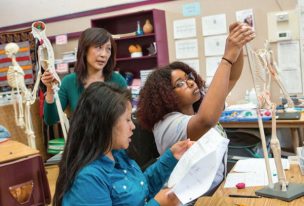Making Meaning Around How Meaning is Made

How does a teacher help a colleague to articulate what student success would look like? How could a teacher support a colleague to unpack what she does and doesn’t understand about structuring powerful academic discussions in the classroom? These are the questions that teacher scholar leaders asked themselves at a recent Mills Teacher Scholar Leaders Network meeting on a Saturday in early February.
The Teacher Scholar Leaders Network brings together teacher leaders on a quarterly basis from each of the Mills Teacher Scholars sites for strategic support in how to lead individuals and a team forward in their learning. The goal of the recent Saturday meeting was to gain clarity on the kinds of conversations that lead to deeper understandings. The fishbowl activity, led by Channon Jackson of New Highland Academy, resulted in the following key understandings for teacher leaders to support their colleagues in conversations about student learning:
1. Seize on moments of clarity
2. Reinforce the agency of the learner
3. Consider the students’ perspective
Seizing on Moments of Clarity
Through listening to Channon think aloud in the fishbowl, teachers leaders realized that a key role for listeners and teacher leaders is to help a speaker name what they know. Participants noticed that the speaker was able to develop her thinking when the listener seized on moments of clarity and named the clear thinking for the speaker. New Highland teacher scholar leader Aija Simmons explains, “What we want to do as a teacher leader is to give people those nuggets [of understanding] that they surfaced but that we’re not sure that they actually caught that they surfaced.”
Reinforce the Agency of the Learner
One of the recurring questions that teacher scholars ask themselves is: How do we support a colleague in her/his learning without making them feel defensive or deficient? Kirsti Peters, a RISE teacher scholar leader, pointed out that she assumes that the learner has agency when she is thinking with a colleague, but this truth may not always be clear to the learner. She noted that in the Mills Teacher Scholars’ consultancy protocol the speaker’s task is not to answer all of the questions that the listeners raise. “This is hard to remember [for the speaker] when you are in the process [of a consultancy] because that’s different from a normal conversation. Someone asks you a question and you answer it….It’s different from a normal conversation….This might be where tension comes up for people because if you feel like you have to answer all of these questions, people can feel defensive, like they need to defend their lesson….” Kirsti pointed out that the speaker needed to feel like she could decide which question were relevant to push her thinking forward.
Considering the students’ perspective
Finally, teacher leaders noted that another important part of this collaborative inquiry process is to help the speaker see the student perspective through asking questions such as: “What would the kids understand…?” “I wonder what the implications for the students would be…” Channon Jackson reflected on her experience as the speaker in the fishbowl activity, “The questions that helped me [think about my practice] the most were the ones that made me think from the students’ perspective like ’If you showed this to the kids do you think they would be able to do this?’ or ‘What do you think the kids understand the evidence to be?’ Instead of questions like ‘What is your definition of evidence?’”
Understanding Adult Learning
Well-trained administrators or coaches may receive support to think this carefully about how their interactions with colleagues develop their thinking, but teachers seldom do. By taking the time to reflect at this level, our teacher scholar leaders have tools to return to their school sites and create communities of practice that are safe, yet professionally challenging. For our teacher scholars, new ideas about their areas of inquiry translate into changed practice, creating rich learning environments for both teachers and students.

